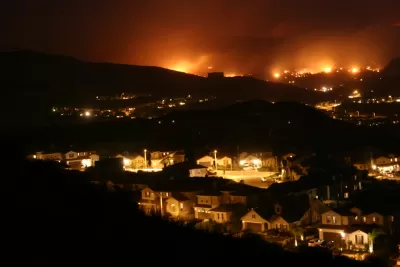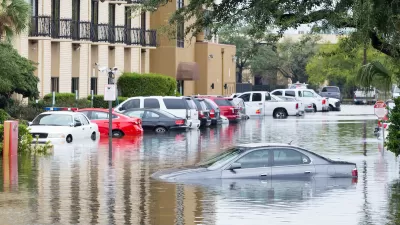The one-year moratorium is a stopgap measure to assist homeowners affected by recent wildfires as the state assesses ways of addressing the root causes of increasingly damaging natural disasters.

In an effort to help homeowners affected by recent wildfires, writes Dale Kasler, California has imposed a one-year ban on insurance companies dropping homeowners in recent fire zones from their insurance policies. The moratorium, which includes areas affected by the Dixie, Caldor, and other 2021 fires, "came a month after Lara imposed a similar moratorium affecting 25,000 homeowners who live in the vicinity of the Lava and Beckwourth Complex fires."
The ban includes parts of 22 Northern California counties and about 325,000 homeowners, but Insurance Commissioner Ricardo Lara "acknowledged that the moratorium isn’t a cure-all for the breakdown of the property-casualty insurance market in areas prone to wildfires," but rather short-term relief for a long-standing crisis. "The insurance commissioner has been negotiating with the industry to find ways to stabilize the rural markets," where homeowners often have to resort to the state's FAIR plan, "which sells bare-bones policies that insure only against wildfire risk. By the time they’re finished purchasing separate policies covering burglary and other perils, their annual insurance bill has doubled or tripled, costing them thousands."
"Among other things, negotiators are trying to establish standards for home and community “hardening” — including fuel breaks, building retrofits and other measures — that would bring insurers back into areas they’ve been deserting."
FULL STORY: California halts insurance cancellations in major wildfire areas across 22 counties

Alabama: Trump Terminates Settlements for Black Communities Harmed By Raw Sewage
Trump deemed the landmark civil rights agreement “illegal DEI and environmental justice policy.”

Planetizen Federal Action Tracker
A weekly monitor of how Trump’s orders and actions are impacting planners and planning in America.

The 120 Year Old Tiny Home Villages That Sheltered San Francisco’s Earthquake Refugees
More than a century ago, San Francisco mobilized to house thousands of residents displaced by the 1906 earthquake. Could their strategy offer a model for the present?

Ken Jennings Launches Transit Web Series
The Jeopardy champ wants you to ride public transit.

BLM To Rescind Public Lands Rule
The change will downgrade conservation, once again putting federal land at risk for mining and other extractive uses.

Indy Neighborhood Group Builds Temporary Multi-Use Path
Community members, aided in part by funding from the city, repurposed a vehicle lane to create a protected bike and pedestrian path for the summer season.
Urban Design for Planners 1: Software Tools
This six-course series explores essential urban design concepts using open source software and equips planners with the tools they need to participate fully in the urban design process.
Planning for Universal Design
Learn the tools for implementing Universal Design in planning regulations.
Clanton & Associates, Inc.
Jessamine County Fiscal Court
Institute for Housing and Urban Development Studies (IHS)
City of Grandview
Harvard GSD Executive Education
Toledo-Lucas County Plan Commissions
Salt Lake City
NYU Wagner Graduate School of Public Service





























